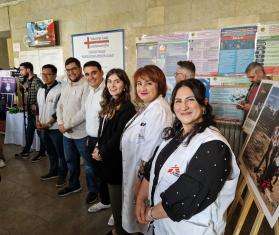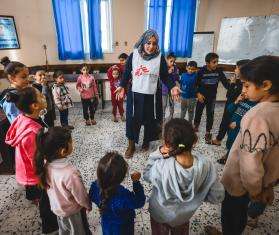The current medical research and development (R&D) system, which relies on patents to stimulate innovation, does not foster the necessary research to address the needs of billions of people in developing countries. This is because the R&D system provides greater rewards for developing drugs that sell well, rather than drugs that meet unaddressed health needs. Pharmaceutical companies therefore largely ignore the needs of patients in developing countries, while gearing their research towards wealthy markets. A new analysis by MSF shows that only one percent of the drugs reaching the market in the three decades between 1974 and 2004 address neglected diseases such as kala azar, sleeping sickness, or tuberculosis.
Governments Must Move Forward with Global R&D Framework at World Health Assembly
As health ministers met in Geneva at the World Health Assembly (WHA) in May 2006, Doctors Without Borders/Médecins Sans Frontières (MSF) called on governments to overhaul the way medical research and development (R&D) is prioritized and financed, and support a resolution proposed by Kenya and Brazil for a "global framework on essential health R&D."
Read more
Why it's High Time to Change the Rules of the Game
The HIV/AIDS pandemic has vividly brought to the world's attention the fact that an increasing percentage of the world's population lives without access to essential medicines. The access crisis is twofold–on the one hand, crucially needed diagnostics, drugs, and vaccines that safely and efficiently respond to diseases affecting the world's poorest do not exist; and on the other, patients living in poverty cannot afford their own treatment, as those medicines that do exist are priced beyond their reach.
Read more
AIDS: Helping Develop a Quick and Easy Viral Load Test
Caring for children living with HIV/AIDS is charged with obstacles. The struggle begins with doctors not being able to tell whether antibodies found in a small baby's blood are from the mother or whether they suggest the child itself is infected with the virus. Frustrated with the situation, MSF has been cooperating with scientists working on a new technology. This is why MSF and the Diagnostics Development Unit at Cambridge University, UK, are entering into an agreement to develop a simple, cheap and rapid HIV viral load test for use in resource-poor settings.
Read more
"Fire in the Veins": Still Injecting Arsenic-derivatives to Treat African Sleeping Sickness
Much More R&D Needed to Make the Disease History
Human African Trypanosomiasis, also known as African Sleeping Sickness, is a fatal and much neglected disease that continues to plague parts of Africa. The drug most commonly used to treat the disease is so toxic that it kills one in 20 patients. While a better drug exists, it is too complex to use in resource-poor settings. In the Democratic Republic of Congo (DRC), sleeping sickness has made a disturbing comeback over the past few decades.
Read more
Tuberculosis Treatment: Needed Breakthrough Won't Happen Without Much Greater Public Investment
With tuberculosis (TB) killing 1.7 million people and newly infecting nine million each year, this curable disease is far from being curbed. The HIV/AIDS pandemic exacerbates TB's scourge through co-infection, as does the increasing emergence of drug-resistant TB. The standard TB treatment available today is long and complex. It relies on drugs developed over forty years ago and takes six months for patients to complete, and the last four decades have brought nothing in the way of improvement.
Read more



